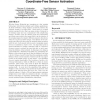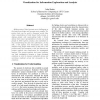1157 search results - page 49 / 232 » Events Can Make Sense |
VTC
2008
IEEE
14 years 3 months ago
2008
IEEE
This paper considers a scenario in which a secondary user makes opportunistic use of a channel allocated to some primary network. The primary network operates in a time-slotted ma...
INFOCOM
2008
IEEE
14 years 3 months ago
2008
IEEE
—In wireless sensor and actor networks (WSANs), a group of sensors and actors are connected by a wireless medium to perform distributed sensing and acting tasks. Sensors usually ...
MOBICOM
2009
ACM
14 years 3 months ago
2009
ACM
Wireless Sensor Networks are emerging as a key sensing technology, with diverse military and civilian applications. In these networks, a large number of sensors perform distribute...
VL
2008
IEEE
14 years 3 months ago
2008
IEEE
Making sense of data becomes more challenging as the data grows larger and becomes more complex. If a picture truly can be worth a thousand words, then clever visualizations of da...
COGSCI
2004
13 years 8 months ago
2004
Previous research suggests that children can infer causal relations from patterns of events. However, what appear to be cases of causal inference may simply reduce to children rec...


